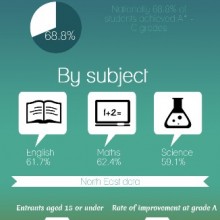We've collated a round-up of all the exam and results data that was released this summer. As well as national statistics, we've looked at how the North East compares with the rest of the country by GCSE, A level and KS2 results.
GCSE results
National
Ofqual has outlined the major trends in this year’s GCSE results as:
• Fewer entries from 15-year-olds
• Results for 16-year-olds are generally more stable than the results for all candidates, because of changing entry patterns.
• More variation at centre -level in English/English language (this appears to be more pronounced in schools that have previously used a modular approach with re-sits").
North East
• The North East has recorded a 1% point increase in improvement at A*-C. This is joint highest improvement rate of any of the English regions (alongside the West Midlands).
• There is also an increase in improvement at grade A*-A in the region of 0.2% points.
• The North East continues to have the second highest rate of overall improvement at grade A or above of any English region at 5.8 % points.
• The region now has the second highest rate of overall improvement at grade C or above up 15.7 percentage points since 2002.
• The analysis released by the Joint Council for Qualifications finds that the NE represents 5% of the total national entries for GCSEs but only achieves 3% of A* grades awarded.
• As a comparison London represents 15% of national GCSE entries but achieves 19% of the A* awarded.
• The North East also had the second highest proportion of entrants aged 15 or under at 19%, behind Yorkshire and the Humber at 20%.
A level results
The Joint Council for Qualifications (JCQ) reported trends towards facilitating subjects, with entries rising across all three sciences and maths.
• English entries were down 4.6 per cent but greater decreases can be seen in non-Facilitating Subjects such as General Studies down 24.3 per cent and Political Studies down 10.6 per cent.
• The proportion of A* grades awarded rose 0.6 percentage points to 8.2 per cent of all awards.
• There was a slight dip at A*-A of 0.3 percentage points to 26.0 per cent and at A*-B of 0.5 percentage points to 52.4 per cent.
• Finding a university place was described in the media as a ‘buyers’ market’ with more students than ever finding a place for September.
• More than 7,280 students found places through clearing, as an estimated 412,170 people secured places overall, up 3 per cent from 2013
Gender
Despite the rise in STEM entries overall, analysis of the figures still reveals stark differences between genders. In Physics 79.3 per cent of entries were by males, who increased their entries by 3.8 per cent this year, compared with just a 0.2 per cent increase for females.
Boys have outperformed girls in Mathematics and Chemistry, whilst girls have outperformed boys in Biology and Physics.
North East KS2 results
Pupil progress
In reading, writing and maths the North East is one per cent above each of the national averages for pupils making two levels of progress with 92 per cent, 94 per cent and 91 per cent respectively. This makes the region the highest achieving outside of London (joint with the North West).
The greatest improvement in pupils making reading progress is in Middlesbrough; achieving 92 per cent, up from 87 per cent in 2013. Similarly, Northumberland’s figures have gone up from 85 per cent to 92 per cent in 2014.
• Northumberland had also done well with writing, with 92 per cent of pupils making two levels of progress, up from 88 per cent last year.
• In maths all areas apart from Northumberland are reaching above the national average. However it is also Northumberland that has seen the biggest improvement in the region, progressing 4 points, from 84 per cent to 88 per cent.
Reaching level 4B
• Reading:10 out of 12 areas are reaching the national average or above
• Writing: 7 out of 12 areas are reaching national average or above
• Maths: All areas are reaching national average or above
• Redcar and Cleveland is the highest achieving for Maths in the region, six percentage points above the national average at 81 per cent.
